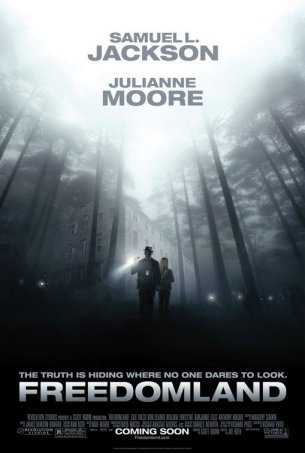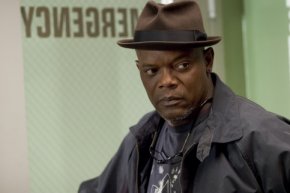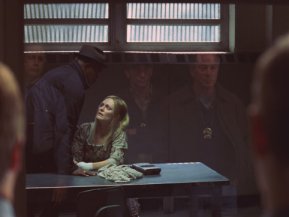|
Freedomland
We live
in the age of spoilers. Let’s not point fingers at
the Internet; some people would, but it is relatively easy
to craftily duck blurbs and nuggets of ruin on sites all
over the web.
That
said, nothing burns more than having something spoiled in
random passing conversation. This can happen in any number
of ways. One time, while waiting in line to gain entrance
to a theatre, an errant youngster exiting Austin
Power in: Goldmember loudly discussed the film's
funniest jokes. Ok, that’s a bad example, but you
get the point.
Freedomland
was inadvertently spoiled in just this sort of fashion sometime
prior to the scheduled Wednesday night screening, causing
an entire hour of the film to be mired in sheer boredom.
The film is not half bad, but not entirely good either.
What it boils down to is essentially an excellent premise
that somehow gets lost in its own focus, and knowing where
it is headed doesn’t really help the situation.
Samuel
L. Jackson returns to drama as Lorenzo Council, a special
investigator in Dempsy who has close ties to a community
in low-income housing project near the border of a neighboring
suburban (and predominately White) town called Gannon. One
night, Brenda Martin (Julianne Moore) stumbles into the
county hospital with blood streaming from her hands and
declares that she had been carjacked by an African-American
male in a hooded sweatshirt near the housing project. Council,
who was out on a call at the project when the incident allegedly
occurred, responds to the incident and eventually gets Martin
to admit that her 4 year-old son, Cody, was asleep in the
backseat of the car.
This,
of course, turns Dempsy into a hotbed of racial tension,
as Brenda’s brother Danny (Ron Eldard) turns out to
be a member of the Gannon Police Force and uses his influence
to have his department press down on Dempsy residents with
full force. Meanwhile, Council still doesn’t feel
that he is getting the whole story from Brenda, so he enlists
the leader of a Missing Children’s Advocacy Group
named Karen Colluci (Edie Falco) to help get a “Mother’s
perspective” on Brenda’s state of mind.
As time
becomes more and more limited, tensions flare up and Council
finds himself fighting a war on two fronts, with community
members feeling racially stereotyped and Brenda’s
family members calling out for justice.
Dealing
with a missing child scenario is a slippery slope, because
at every twist and turn there are individuals looking to
make a point and prove and injustice with a family’s
newfound platform via the media and the news. This is touched
on to an extent, and other valid issues also bubble up to
the to top of Freedomland, but unfortunately the
film feels trapped, confined, and even confused with its
very own premise.
Based
on the novel by Richard Price, his work adapting his own
screenplay may have played a factor in the resulting troubled
narrative. Feeling at times as though Price was unable to
gauge what should stay, what should be said, and ultimately
what should go, Freedomland sometimes resonates,
and a split-second later finds its characters making leaps
of assumption that the audience may even have trouble following.
In fact,
perhaps causing this meandering confusion to become all
the more apparent, the location from which the film garners
its title seems to spring up merely based on contrivance
and matter-of-fact plausibility. For a moment, we don’t
fully understand why this location is important, or how
Council arrived at the decision to go there, other than
the inference that some sort of hazing ritual used to occur
there.
This
is no discredit to Moore, Falco, or Jackson, who make due
with what they are given and even offer moving stabs at
these troubled characters. There are sequences here that
work individually, just as there are statements being made
that are relevant and poignant, and moreso need to be given
a public platform.
Even
William Forsythe, a character actor whose name in the credits
usually begs a double cross or an evil twist or turn at
some stage in the film, enacts a touching and understated
(and apparently un-credited if you go by IMDb’s profile)
turn as Council’s partner.
Price’s
novel no doubt goes to great lengths to express and focus
on the internalized struggles of each character, as novels
lend to the strength of giving readers a chance to view
the world from the eyes of whatever character the writer
chooses to use for a given chapter. Film works a bit differently,
and requires a skilled hand to know when to make subtle
leaps and when to spell things out to viewers.
Perhaps
had Price and director Joe Roth had a more lengthy runtime
to construct this seemingly complex narrative things would
have felt more clear and all the more poignant, but for
now it would be preferred that potential viewers take a
chance on the novel before sitting down with this film.
Rating: 
|








